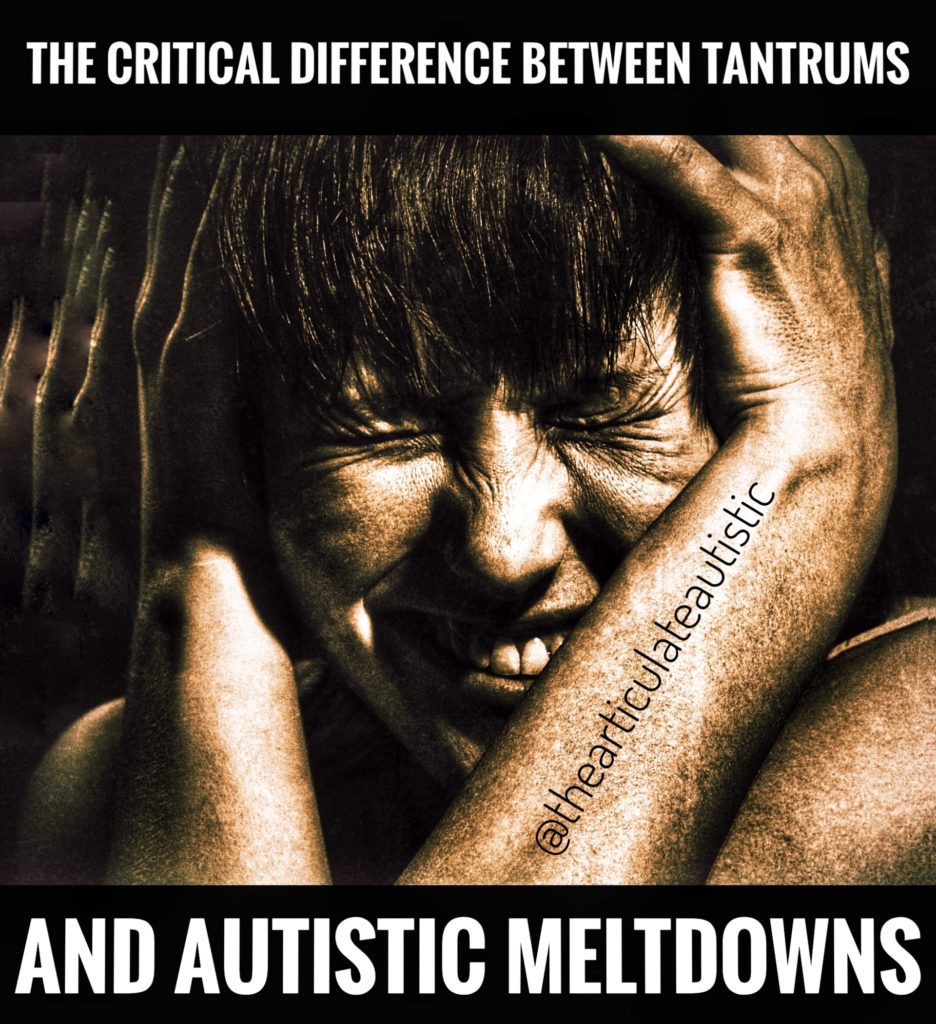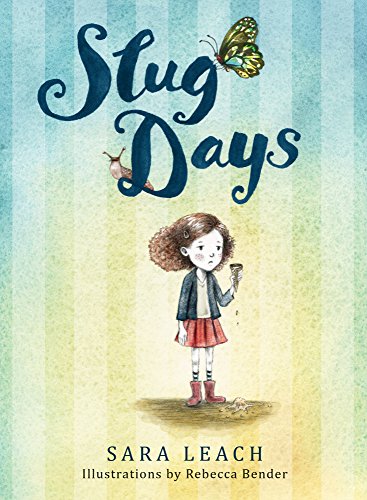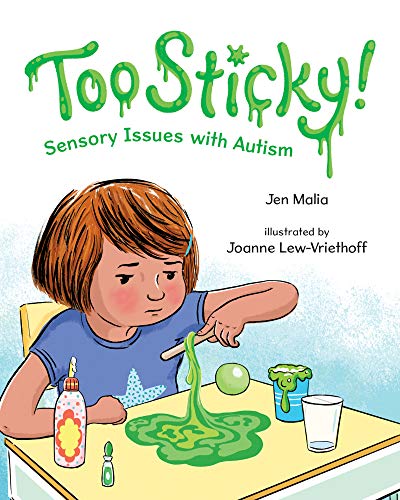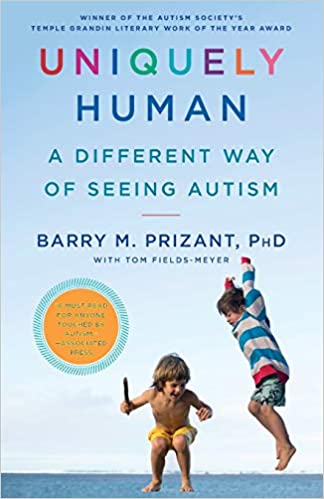An Autistic Meltdown Is Not a Tantrum – How to Spot the Difference and Avoid Further Traumatizing Your Loved One

I’ve been hanging out on Quora a lot lately answering questions from neurotypical people looking to better understand their autistic loved ones, and I continue to come across a question about autistic people and tantrums.
Most of what neurotypical people would call “tantrums” are actually meltdowns for autistic people, and not knowing the difference between them can cause significant psychological harm to the autistic person, so I wanted to write a piece about it.
A tantrum is a purposeful action designed to influence an outcome. A meltdown is an uncontrollable neurological event.
Tantrum
Let’s say you take your neurotypical child to a grocery store, and they pick out a candy bar, but you tell them they can’t have it. Suddenly, they’re jumping up and down and wailing. During this, you notice that your child periodically stops what they’re doing to glance over at you and others to see if their behavior is having the desired effect.
“Will someone buy me the candy bar to stop me from screaming?” This is what the neurotypical child is thinking.
There is a conscious thought process behind this behavior. This isn’t to minimize the distress, annoyance, or disappointment the child is feeling, but it is something done on purpose to achieve a desired goal.
Meltdown
Let’s say you take your autistic child to a grocery store, and he seems content and calm, holding your hand and walking through the aisles with you. Suddenly, there is a screeching sound over the loudspeaker as an employee tries to make a verbal announcement but bungles it. Your child, who was just calm, is now screaming, scrambling to cover his ears, beet-red in the face, tears squeezing out of tightly-clenched eyes, and running, blindly down the aisles, careening off shelves and people as he goes.
“The noise!! The noise!! The noise!! The noise!! The noise!! The noise!! The noise!!” This is the only thing running through the autistic child’s head.
There is no conscious thought behind these behaviors or actions! The body’s fight-or-flight response has kicked in full throttle, and the only thing that body and brain can do is try to escape the sensory hell that is the offending sound.
An autistic person having a meltdown does not check for the reactions of others, he or she may cease to understand that “others” are there or that there is even such a thing! The fear and anguish is all-encompassing and takes over any ability to reason.
Also, and this is very important, there is no concern for safety on the part of the autistic person in a meltdown. We will run headlong into traffic to escape a sound, a light, a texture, a taste, etc. if it’s severe enough to our senses.
We’re not trying to hurt ourselves, we just don’t even realize what’s going on in our surroundings at that point. Nothing exists in that moment but the pain and the need to escape it. It is a neurological event brought on by sensory overload, and it cannot be controlled.
Don’t Punish, Protect
Punishing, yelling, bullying, belittling, and even ignoring an autistic person during a meltdown only compounds the trauma this person is already experiencing 10-fold. It’s the equivalent of smacking someone around for having a seizure!
When your autistic loved one is in a meltdown, they must first be kept safe. Get them away from the offending sensory information as fast as possible to allow their nervous system to calm down from the immediate fight-or-flight response. As calmly and gently as possible, get them to a place where they can feel safe; your car, their room, etc.
Offer stimulation you know the autistic person has responded well to in the past. This could be a weighted blanket, some stim toys, a sensory sock, or just to curl up in the closet amongst some clothes and be quiet for a while.
Whatever the case, avoid trying to engage in back-and-forth speech at this point. You can’t reason with someone in this state, and your attempts to get us to speak will just feel like more sensory overload and may worsen the meltdown.
Speaking is usually fine if you do so in a calm, gentle manner and use it to validate the autistic person’s experience while also assuring them that you do not expect a verbal response.
Something like:
“I know the loud sound at the store really scared you. You’re OK. You’re safe. You’re home now. You don’t have to talk. I just want you to know I’m here.”
Be with the autistic person. If they say or indicate they need space, move out of their immediate space if they are not in danger of hurting themselves (although you might need to stay close by in the doorway or hallway with the door cracked open).
Make a Plan
The best way to handle meltdowns is to try to reduce their frequency by having an agreed-upon plan for when they do occur.
Reducing the frequency of meltdowns might mean changing the time you go out shopping to a later time in the day or during a weeknight when there aren’t as many people around.
A plan could look like communicating through the best strategy for the autistic person when they are feeling overwhelmed. Could they give you an agreed-upon signal when the sensory information is getting too much or when they feel a meltdown coming on? Do they have ear defenders, dark glasses, and/or sensory toys to help them cope? What about coping strategies themselves? Breathing exercises, counting, deep pressure?
Agree upon a plan, and stick to it. Routine and familiarity are very important for sensory and emotional regulation on the part of the autistic person, and we need this more than ever when we are in a state of sensory overload.
The Takeaway
The difference between a tantrum and a meltdown is night and day. A tantrum is a purposeful act designed to achieve a goal, and a meltdown is an uncontrollable neurological event. Having a plan in place to help avoid meltdowns and cope with sensory overload can go a long way in reducing the frequency and severity of meltdowns.
The most important thing to remember is that the world is turned up to 10 for most of us, and it can feel very unsafe and confusing at times. When we’re younger, especially, it can be very difficult for us to cope in your world. Everything your brain filters out automatically, ours has to do manually, and that is exhausting. A meltdown doesn’t need yelling or “correction”, it needs patience, love, understanding, and a feeling that the person we rely on the most is our unconditional safe space.
Books for Better Understanding the Autistic Brain
(Whether you’re an autistic person who is newly diagnosed, or you have a loved one on the spectrum, the books below can help you better understand the autistic brain.)
Want downloadable, PDF-format copies of these blog posts to print and use with your loved ones or small class? Click here to become a Patreon supporter!












Thanks Jamie, I think you put me onto Aspergirls.. great book. I went for the audible version.
Hi, Adam. Thank you for your comment. I hope you find the book helpful. 🙂